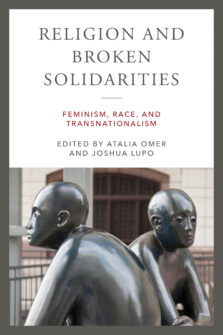 In this episode of the Kroc Cast, Contending Modernities editor and writer Josh Lupo and Co-Director Atalia Omer interview three contributors to their edited volume, Religion and Broken Solidarities: Feminism, Race, and Transnationalism. The volume explores distinct moments in time across various geopolitical settings when solidarity failed to be realized between marginalized communities because of differences of race, nationalism, religion, and/or ethnicity. These contributions are intended to open up paths for imagining new forms of solidarity now and in the future.
In this episode of the Kroc Cast, Contending Modernities editor and writer Josh Lupo and Co-Director Atalia Omer interview three contributors to their edited volume, Religion and Broken Solidarities: Feminism, Race, and Transnationalism. The volume explores distinct moments in time across various geopolitical settings when solidarity failed to be realized between marginalized communities because of differences of race, nationalism, religion, and/or ethnicity. These contributions are intended to open up paths for imagining new forms of solidarity now and in the future.
In conversation with Ruth Carmi, the editors discuss the reasons why alliances between Mizrahi Jews and Palestinians have been so difficult to achieve, in spite of both groups’ marginalization by the Israeli government. With Brenna Moore, they reflect upon Black Catholic attempts to create transnational partnerships that challenged the White Protestant status quo in early twentieth-century geopolitics. Finally, with Melani McAlister, they consider the role of the literary imagination in helping us contemplate paths beyond the trappings of our current political order. In each of these exchanges, the authors also reflect on their findings in light of the current political moment, rather it be in the recent challenges to the authority of the supreme court in Israel, the Black Lives Matter protests of summer 2020 following the murder of George Floyd, or in the growing calls to substantively address the threat of climate change. What is revealed in these conversations is that challenging the structures that marginalize the most vulnerable in our society requires an intersectional analysis that refuses to treat any marker of identity or belonging as siloed off from others. Below are some key quotes from the conversation.
On the Resonances Between Movements
Ruth Carmi: “It is a collective project of critique or meaning-making with a liberatory potential…The critique this book offers shows the possibility of reimaging identity in a way that transcends national boundaries and can create new solidarities and alliances.”
“Re-imaging is not one size fits all…As you read the essays you can see that the authors are pushing beyond reductive ways of describing how solidarities are formed or are prevented from forming.”
Brenna Moore: “McKay and Terry wrote about the importance of not just writing about Black trauma or violence. This is what White audiences wanted…When we write about these people, we bring those stories of Black joy into our classrooms. These writers want to complicate the one-dimensional narrative of the media about Black life.”
On Writing and Political Action
Brenna Moore: “There is so much we can learn from these Black Catholic writers. They were very smart writers of non-fiction … and they did a lot of thinking about the power of writing…Writing operates in the realm of the power of the imagination and how important the imagination is for combatting structures of dehumanization that animate racist violence.”
Melani McAlister: “I use literature to challenge the empirical reality we know…It might be possible to imagine these connections [of solidarity] more fully and more richly, and to imagine that the reason we don’t do that has to do with the way we are trained.”
“I think literature can be really important to spark our political imaginations if we let it…and it requires us to let go of some of the assumptions we carry.”
On the Potential for New Forms of Solidarity
On the potential for the protests against the reform to the Supreme Court in Israel to spark new forms of solidarity movements, Ruth Carmi says: “The supreme court is one of the pillars that upholds and maintains the occupation in the legal apartheid in occupied territories and deprives Palestinians of group rights…This doesn’t mean welcoming the overhaul of the supreme court…, but Palestinians as well as Ethiopian and Mizrahi Jews cannot partake in a discourse that portrays the Supreme Court as a site of justice or as an oracle of human rights.”
Melani McAlister: “In environmentalism, it is clear to most people that we are completely in this together. There is no chance of the world saving itself unless both rich and poor countries, people of all different means, find their way into the struggle and work together.”
“When we think about solidarity as a political question it requires (1) emotional commitments, (2) humility, and (3) discipline. We have to keep in the struggle even when it is not fun.”

